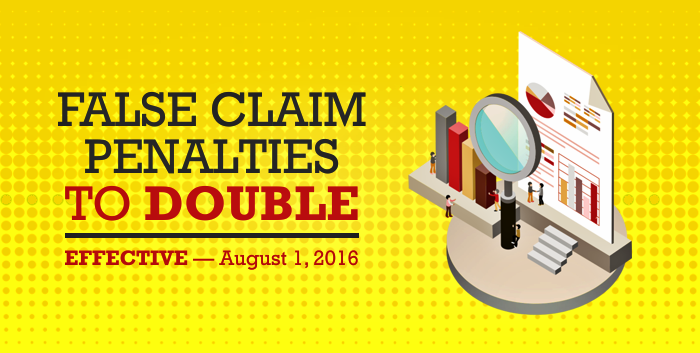The False Claims Act (FCA), also called the “Lincoln Law”, is a federal law that imposes liability on persons and companies who defraud governmental programs
- The Department of Justice has almost doubled the penalties under the FCA. As of August 1, the minimum penalty for each false claim will increase from $5,500 to $10,781, and the maximum penalty for each false claim will increase from $11,000 to $21,563.
- Any physician, hospital or other health-care provider that participates in Medicare, Medicaid, CHAMPUS or any other federally funded health-care program is liable under the FCA law.
- This increased penalty could create incentives for the government and private litigants who sue on its behalf to pursue FCA claims even where damages may be difficult to prove.
- This change will apply to penalties assessed after August 1, 2016 for violations that occurred after November 2, 2015. Comments to the interim final rule are due August 29, 2016.
Why should You Care?
- Of the $3.5 billion recovered from settlements and judgments under the FCA in 2015 , $1.9 billion came from companies or individuals in the healthcare industry.
- The financial exposure is huge! These penalties are imposed on top of the award of damages, which are calculated at three times the amount of the loss sustained by the government.
- Under the FCA, prosecutors only have to prove that improper claims were submitted. Whether the fraud was intentional is irrelevant, unlike in criminal cases where that must be proved.
- People and companies who receive the government funds, even if they were unaware of the fraud being committed, are liable under the FCA law. The law holds them accountable because they failed to properly supervise those who submitted claims on their behalf.
- Individual physicians can also be sued under the FCA law. Past charges have included up-coding, routinely billing for unnecessary services, substandard services, false diagnoses to justify claims and kickbacks for referrals.
Take Away for physicians
- Whether a violation of the federal anti-kickback law constitutes a False Claims Act violation is currently one of the most hotly disputed issues in fraud litigation. Doctors should be wary of accepting any benefit (research grant, free rent, free products, etc.) from hospitals, labs or other providers of medical services.
- The government looks at “substance over form” so make sure that outings and dinners dubbed as educational events actually contain an education component.
- If you are a speaker for a company, make sure that you actually discuss the clinical aspects that are FDA approved and are not given that title for your prescribing habits alone.
- Review what you are asked to sign in terms of pre-authorization requests.
- Carefully choose companies or employees to perform functions such as billing, for you will be held liable for any scam they run when they submit claims on your behalf. Be skeptical of anyone that offers to maximize recoveries far beyond the norm.
- Create an environment that rewards whistleblowers for reporting wrongdoing in-house. Many, if not most, whistleblowers who have filed lawsuits have done so only after being harassed, ostracized or punished when they reported the problem to their managers.
Additional Reading:
Are you unknowingly committing a Medicare fraud ?
Reference :
Phillips & Cohen LLP. How to avoid liability under the False Claims Act [Blog Post]. Retrieved from http://www.phillipsandcohen.com/Articles-by-Attorneys/How-to-avoid-liability-under-the-False-Claims-Act.shtml
Rachel V. Rose, JD, MBA. (2015, November 12). How the False Claims Act Can Hurt Physicians[Blog Post]. Retrieved from http://www.physicianspractice.com/blog/how-false-claims-act-can-hurt-physicians
